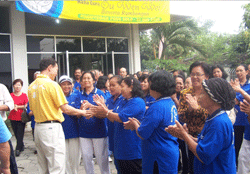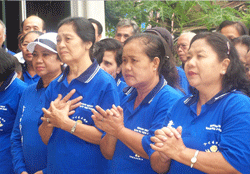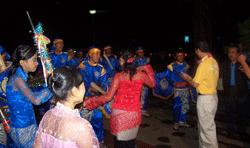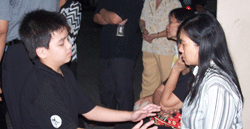Report on Master Ou’s May 2006 Trip to Indonesia
On May 15, 2006, Master Ou and four Pangu Shengong (PGSG) students from China arrived at the Surabaya Airport in Indonesia, where dozens of local students from different cities (Jakarta, Surabaya, Cilacap, and Badu) in Indonesia were waiting for them.
As usual, the tour was very busy. Master Ou led a group of fifteen PGSG students traveling to Surabaya, Jakarta, Cilacap, Solo, Ronwang, Badu, and Jiliwen to give lectures and healing sessions. Everyday they had to spend three to five hours on transportation. As soon as they arrived at a destination, Master Ou would start to work immediately (some days, he gave healings to over one hundred patients). It would be ten o’clock in the evening or even later when his work was over.
In the City of Solo, after class, Master Ou taught students, at their request, to sing, “The Song of Pangu Shengong.” They learned it very earnestly, even though most of them do not understand Chinese. At the moment of farewell, they put their hands on their chests and with great sincerity sang a well-known Indonesian song to Master Ou. The theme of the song is: there is no more difficulty on the path, things are going to be better tomorrow.
In Cilacap, Master Ou was welcomed in a local traditional ceremony that is reserved for greeting only the most honorable guests. As soon as Master Ou’s car arrived, thirty people in costumes began dancing and singing to welcome him and his group. Immediately Master Ou joined them in happily dancing and singing.
During this trip Master Ou added a few new features to his lectures. For example, he sent energy (qi) to the audience by singing songs he had composed, which made the audience feel the energy deeper and stronger. He also let some local PGSG students share their testimonials with the audience. The following are some of the testimonials:
Prof. Hamdai
Professor Hamdai teaches at a College in Malang City. Two years ago, when his vision became very bad, he went to a Singapore Hospital for help, and the doctors told him that they could perform surgery on him, but there was no guarantee that it would work and it would cost $10,000 USD. He decided not to have the surgery and went back to Indonesia. At that time, his vision dropped down almost to zero. He was fortunately that at this crucial time he had the chance to learn PGSG. As soon as he learned it, he deeply studied the motto of PGSG (“Take kindness and benevolence as basis; take frankness and friendliness to heart”). He was more than happy to use all his time to practice PGSG everyday. He practiced six times, took a rest, then did it another six times; he did three such six-time rounds a day. After three days of practice, he began to see lights; one week later, he began to see objects. Several months later, his vision was back to normal. He made a calculation and compared the money he had spent for medicine before and after he learned PGSG. Before he started to practice PGSG, he had to spend several million Indonesian Rupiahs (several hundred US dollars) every month on his health issues (he had a few other health problems besides the vision problem). Since he started to practice PGSG, in the past two years he hasn’t had to spend a penny for medicine.
He said: “I feel very grateful that Master Ou brought Pangu Shengong to us and helped me gain my vision back. The philosophy of kindness that is proposed by Pangu Shengong is very good, and we should try our best to spread Pangu Shengong to the whole world, because I believe that only Pangu Shengong can truly save the world.”
Mr. Amir
Mr. Amir is an engineer at an oil company. He is also the vice president of the PGSG International Institute, Indonesia Chapter. He is very healthy and strong, so he learned PGSG not for his physical health instead he learned it because he believes in the principle of being the kind of person proposed by PGSG; and he appreciates the range of countries, ethnic groups, and religions in the PGSG family. He said: “As one of the organizers of Pangu Shengong in Cilacap, I must set a good example by taking part in the Pangu Shengong group activities without any excuses. I must keep a big heart in taking this responsibility. Every week, we take turns giving lectures to other Pangu Shengong students, sharing Master Ou’s lectures and articles with them so as to improve our understanding of the theory of Pangu Shengong. We have set up many subgroups so Pangu Shengong students can practice together in various locations. Subgroups will also from time to time exchange experiences with each other and in this way learn from each other.”
When Mr. Amir talked about reforming one’s heart and soul with PGSG principles, he gave an example: “Before I learned Pangu Shengong, I had a bad temper, especially when I witnessed something unjust. One day after I started to practice Pangu Shengong, my car slightly hit a motorcycle. I got out of my car immediately and apologized to the motorcyclist. But that man was still very angry and hit me in the face. I stood still with a smile and continued to apologize. Afterward, I was surprised that I was so tolerant and kind. How could this be? The answer soon came to my mind-it’s because of Master Ou’s teaching.”
When Mr. Amir talked about his wishes, he said: “I’m going to retire in two months. I plan to move back to my hometown of Malang, which is pretty close to where Sunny Nanta lives. I would like to assist Sunny in teaching Pangu Shengong throughout the whole country, setting up Pangu Shengong groups in every city and county.”
Saruon
Saruon is a young worker in Jakarta. He had liver cancer and later it spread to his stomach. He was in a critical state and spit blood frequently. Luckily, his bosses were PGSG students. At the beginning, they encouraged him to learn PGSG. Soon he saw some improvement in his condition, and then gradually he came to accept PGSG and practice it willingly. Since then his health improved dramatically until he finally recovered completely. This young man feels very grateful and tells everybody he meets that he would not be alive and healthy without PGSG. Right now, whenever possible, he uses his time to teach others PGSG, guide others to have better understanding of PGSG, and heal others with the PGSG healing skill. He said that he will try his best to improve his healing ability to help more patients.
Wang Xin Xiu
Wang Xin Xiu is a thirteen-year-old boy. When he was nine years old, he followed his mother’s lead and started practicing PGSG. He learned PGSG because he wanted to change his bad temper; then he wanted his father to learn PGSG to change his bad temper as well in order to build a more harmonious family. Four years went by, and the boy fulfilled his goal: he had successfully reformed his bad temper and persuaded his father to practice PGSG! He also received another bonus, his studies at school became better and better. Moreover, Wang Xin Xiu (the boy on the left in the picture below) takes every opportunity to give healings to help others.




 Mr. Xue
Mr. Xue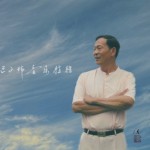
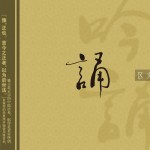
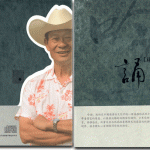


 Paul Fraser
Paul Fraser